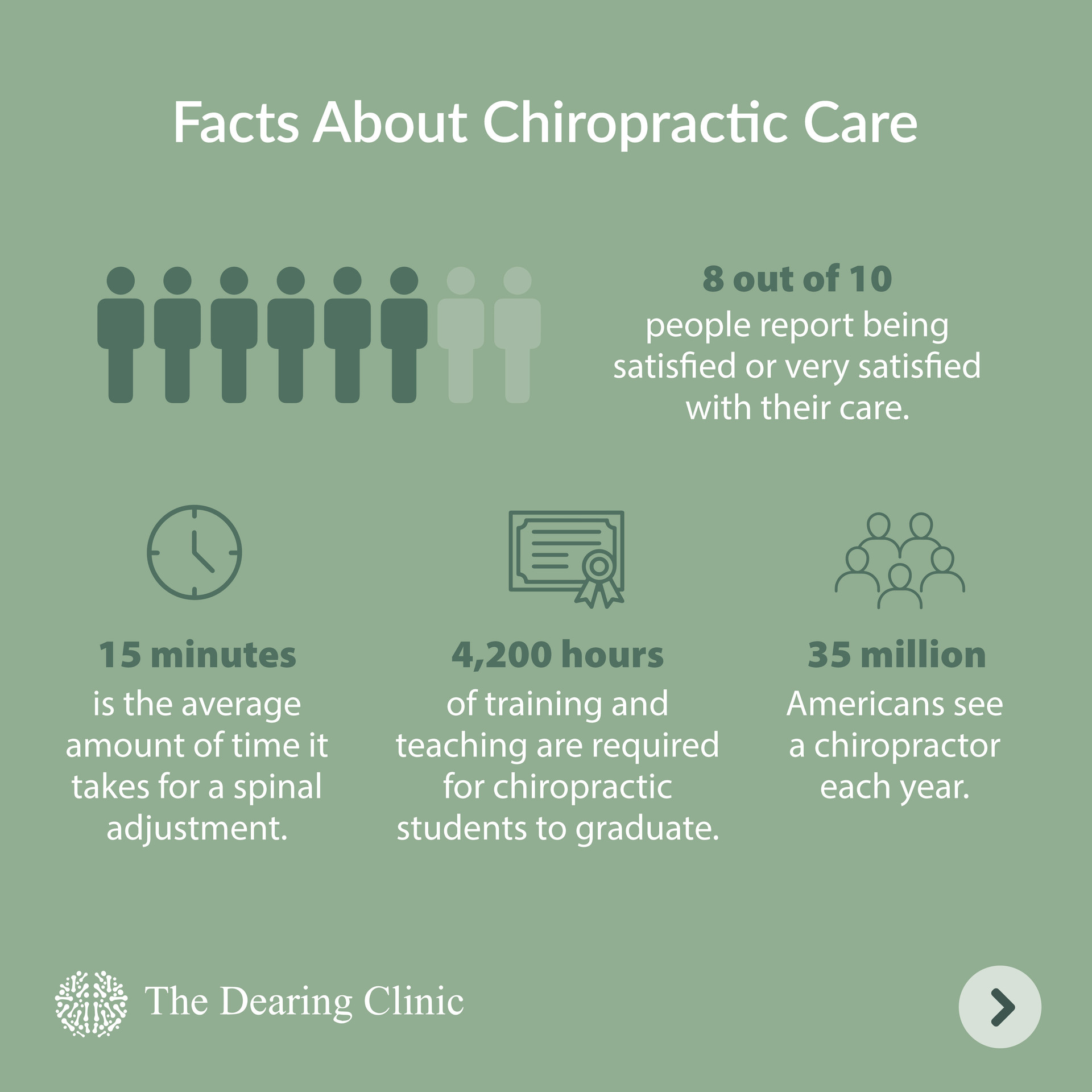What Does a Chiropractor Do? Benefits of Chiropractic Care FAQs
What does a chiropractor do? A chiropractor first assesses and then diagnoses and treats patients experiencing musculoskeletal issues. Chiropractors use their hands or specialized instruments to perform a chiropractic adjustment to restore proper alignment and synchronization to the body.


What does a chiropractor do? A chiropractor first assesses and then diagnoses and treats patients experiencing musculoskeletal issues. Chiropractors use their hands or specialized instruments to perform a chiropractic adjustment to restore proper alignment and synchronization to the body.
“What does a chiropractor do?”
It’s a common question asked of those who are more familiar with conventional medicine and have never experienced the benefits of chiropractic care. Commonly misunderstood as a treatment solely for pain, chiropractic care is a natural and non-invasive approach to healthcare that prioritizes improving the overall function of your body by focusing on the relationship between your spine and nervous system.
As a result, a chiropractor must understand full-body function and how the body’s internal systems communicate with one another. To better understand what a chiropractor does and get a comprehensive view of chiropractic care, let’s take a closer look at the role of a chiropractor, how a chiropractic adjustment works, and the various benefits of chiropractic care. You’ll also get answers to your top FAQs so you can determine if chiropractic care is right for you.
What is Chiropractic Care?
Chiropractic care is a form of alternative medicine that takes a holistic approach to healing the body. Unlike conventional medicine, which often relies on medications and even surgery, chiropractic care is based on the belief that proper alignment of your musculoskeletal structure, particularly your spine, enables your body to heal itself without the need for medications or invasive surgeries. In short, the goal of chiropractic care is to address the root cause of the problem rather than merely treating the symptoms.
While it’s commonly sought for pain-related issues such as back pain, neck pain, and headaches, it’s important to note that chiropractic care encompasses much more. Chiropractic care centers around the interconnected relationship between the spine and the nervous system.
Your spine is the center of your nervous system, which is responsible for transmitting messages between your brain and the rest of your body, meaning it controls and coordinates all of your bodily functions. Because your spine and nervous system are so interrelated, whenever there’s a misalignment in your spine, it can disrupt the flow of information through your nervous system, leading to various health issues.
Research has shown that chiropractic adjustments can enhance the body’s ability to self-regulate and heal. And by restoring proper spinal alignment, reducing nerve interference, and promoting better communication between your brain and your body, chiropractic care can improve the function of many of your organs and systems.
This is why pain relief is just one of the many benefits of chiropractic care. From increased energy levels to improved sleep and even enhanced immune function, chiropractic care has been shown to benefit your health in many different ways.
But before we discuss the numerous benefits of chiropractic care in more detail, let’s first definitively answer two lingering questions: What is a chiropractor, and what does a chiropractor do?

What Is a Chiropractor?
Now that you know that chiropractic care is based on the belief that your body has an innate ability to heal itself when it’s in proper alignment and that changing stagnant neurological maps for movement is critical for overall health. When your brain’s understanding of your full potential range of motion (or “maps”) becomes distorted over time due to certain repetitive movements and postures, it can interfere with your body’s ability to function properly.
As such, a chiropractor is a healthcare professional and licensed practitioner who specializes in the diagnosis and treatment of musculoskeletal and nervous system disorders, particularly those related to the spine. If a chiropractor finds your body is misaligned and out of sync, he or she performs a chiropractic adjustment through manual manipulations to realign your spine and promote proper function.
Some chiropractors who go on to specialize in functional neurology, known as functional neurologists, choose to further their education and training to gain even more insight into the relationship between your nervous and musculoskeletal systems. These practitioners use a variety of specialized techniques to promote optimal nerve function; rehabilitation strategies for the brain, brainstem, and reflex coordinators within the nervous system, the synchronization between your brain and body, and your overall neurological health.
What Does a Chiropractor Do?
Whenever you visit a chiropractor, keep in mind that his or her main goal is to treat your concern by assessing and diagnosing the root cause(s) of your musculoskeletal issues. Once the root cause is found, what does a chiropractor do next?
Chiropractors use their hands or specialized instruments to perform chiropractic adjustments, also known as spinal manipulations, to restore proper alignment and function to your spine.
During a session, your chiropractor will start by taking a detailed medical history and performing a thorough physical examination. They may also order diagnostic tests, such as X-rays or MRI scans, to further assess your condition.
Based on their findings, your chiropractor will develop a customized treatment plan tailored to your specific needs. But this plan may not be limited to spinal adjustments and can also include therapeutic exercises, soft tissue therapy, nutritional counseling, and more to support your body’s healing process. The treatment plan depends solely on what’s out of rhythm in your body.
Chiropractors may also provide advice on posture, ergonomics, and lifestyle modifications to help prevent future issues and promote overall wellness. In short, by aligning your spine and resyncing your body to restore proper nervous system function, chiropractors help to facilitate your body’s natural healing process.
In addition to chiropractic adjustments, chiropractors may also incorporate other therapeutic techniques into their treatment plans. These can include massage therapy, stretching exercises, nutritional counseling, and lifestyle modifications.
Keep in mind that the goal is to provide comprehensive care that addresses not only the immediate symptoms but also the underlying causes of the problem. And, as a result, patients often report a variety of benefits of chiropractic care. Let’s take a look at some of the well-known as well as the more surprising benefits of chiropractic care.
8 Benefits of Chiropractic Care
Now that you know more about what a chiropractor does and how he or she does it, let’s review the numerous benefits of chiropractic care.
1. Aids pain management
One of the most well-known benefits of chiropractic adjustment is its ability to support pain relief. While it’s known to provide relief to a variety of pain syndromes, including headaches and joint pain, research has shown that chiropractic adjustment is especially effective for neck and lower back pain relief.
2. Increases mobility
In addition to supporting pain management, chiropractic care is a highly effective treatment option for those looking to improve mobility. By restoring proper spinal alignment, getting a chiropractic adjustment can support improved joint function and increased range of motion.
3. Supports immunity
Researchers have found that chiropractic adjustments can enhance immune system function. Specifically, research has shown that receiving a chiropractic adjustment significantly increased people’s white blood cell count within 15 minutes of the adjustment. This is important because white blood cells fight viruses and bacteria, leading researchers to believe that getting an adjustment and synchronizing your brain and body can support the strength of your immune system.
4. Enhances sports performance
When you think of the question, “What does a chiropractor do?” images of great athletic performance likely don’t spring to mind. Yet, researchers have found that chiropractic care can help athletes enhance their performance by addressing biochemical imbalances, optimizing neuromuscular function, promoting faster recovery, and reducing the risk of injuries.
5. Promotes stress relief
Chiropractic adjustments are also known to help reduce stress levels and promote relaxation by relieving tension in the muscles and promoting better sleep. Specifically, researchers have found lower serum levels of cortisol (the hormone your body secretes during times of stress) immediately following chiropractic adjustments.
6. Improves posture
Finally, research has shown that correcting spinal misalignments via chiropractic care can help improve posture and reduce the risk of developing musculoskeletal issues in the future. Specifically, using a chiropractic adjustment as a first line approach followed by implementing specific stretches and exercises has been found to support improved posture.
7. Supports healthy weight management
Due to its effectiveness in supporting synchronicity between the brain and body, the benefits of chiropractic care for weight loss should not be underestimated. Remember, your spine is the center of your nervous system, and your nervous system is responsible for transmitting messages between your brain and the rest of your body. If your spine is out of sync with your body, the signals from your stomach to your brain that you’re satisfied and full may not be received, which can lead to overeating and weight gain.
So, what does a chiropractor do to support your weight management goals? He or she ensures proper alignment to promote synchronization between your brain and your gut. And research has shown that engaging in chiropractic adjustments augmented with nutritional intervention, exercise, and one-on-one counseling is very effective for healthy weight management.
8. Helps to calm anxiety
Finally, let’s review the benefits of chiropractic care for anxiety. As you may recall, anxiety disorders are associated with abnormal neural oscillations in the brain. By realigning your brain and body, you can restore your brain’s ability to oscillate in a normal rhythm.
In addition to chiropractic adjustments, a chiropractor can provide specific movements, exercises, and/or functional neurological therapies to aid in calming anxiety and restoring calm to your life.

10 FAQs About Getting a Chiropractic Adjustment
While chiropractic care is generally regarded as a safe and effective treatment option for many people, it’s normal to have some lingering questions. Let’s take a look at some of the most frequently asked questions that people have after learning the answer to, “What does a chiropractor do?”
1. Is chiropractic care painful?
Chiropractic adjustments are generally painless, though some patients may experience mild soreness or discomfort after an adjustment. Fortunately, this soreness is temporary and part of the healing process.
2. How many chiropractic sessions will I need?
The number of sessions you’ll need depends on the nature and severity of your condition. At The Dearing Clinic, we assess your progress regularly and adjust your treatment plan accordingly.
For example, if your personal situation requires the use of multiple modalities, such as chiropractic adjustments, acupuncture, rehabilitation, and other simple yet effective medical therapies, you may experience faster and more enhanced results. Often, a problem that’s lasted three to four years can begin improving within just three visits.
Otherwise, on average, we often see major benefits of chiropractic care and stabilization within eight to 12 visits.
3. Can chiropractic care treat all types of pain?
While chiropractic care can effectively alleviate many types of pain, it may not be suitable for all conditions. A thorough examination by a chiropractor can determine if chiropractic care is appropriate for your specific situation.
4. Is chiropractic care safe for pregnant women?
Yes, chiropractic care is generally regarded to be safe for pregnant women. In fact, there are specific benefits of chiropractic care during pregnancy, as it’s been shown to help manage common pregnancy-related discomforts. In fact, research has shown that 50 percent of all pregnant women experience back pain at some point during their pregnancy. Just make sure to find a chiropractor who’s experienced in working with pregnant patients.
At The Dearing Clinic, we use simple and gentle modalities to ensure balance of the pelvis as needed throughout pregnancy. We use these modalities more frequently as the mother nears her due date to ensure that loosening ligaments don’t allow the pelvis and spine to misalign, as this can contribute to complications that might affect delivery.
5. What does a chiropractor do beyond treating pain? Can I see a chiropractor even if I don’t have any pain?
Absolutely! Chiropractic care is not just for people suffering from pain. Regular chiropractic adjustments can help maintain proper cerebrospinal fluid flow around the brain. This is actually one of the most undervalued benefits of chiropractic adjustments.
Specifically, craniosacral techniques are gentle osteopathic techniques that help increase the mobility of the bones in your skull, face, and head — all of which participate in “washing” the brain’s metabolites and toxic proteins that build and accumulate as we age. These techniques are often employed in many spinal manipulations because the spine will twist up and lock down one side of the skull and jaw.
Also, keep in mind that even without pain, you can see a chiropractor to help maintain spinal health, prevent future issues, promote synchronization and rhythm between the brain and body, and promote overall well-being.
6. Are chiropractors doctors?
A chiropractor is a healthcare professional and licensed practitioner with a doctor of chiropractic degree (DC). They have attended eight years of school followed by residency and fellowships, just as medical doctors are required to do.
7. What can chiropractors treat?
Chiropractors can treat a variety of conditions, including lower back pain, neck pain, whiplash, concussions, sciatica, spinal injuries, knee pain, poor range of motion, headaches and migraines, and stress. Additionally, research has shown that chiropractic care can support the treatment of digestive disorders, migraines, sinus pressure, congestion, allergies, and more.
Interestingly, research has even shown that benefits of infant chiropractic include reduced fussiness due to colic, improved breastfeeding, and reduced occurrences of ear infections.
8. What toxins are released after a chiropractic adjustment?
Toxins are released by all cells and tissues within the body as part of the detoxification process that each cell has. These toxins can accumulate as the cell makes energy or they can be accumulated environmental toxins that the immune system is always working to eliminate.
These toxins all travel out of your body through the lymphatic vessels that run alongside the blood vessels in your body. These vessels don’t have a heart to pump them like blood vessels do, so proper movement and balanced movements through a full range of motion each day help to remove those toxins. In that way, receiving quality chiropractic adjustments help all tissues move better and this can help to enhance the removal of toxins that are already there and may otherwise become stuck.
9. Are there any chiropractic adjustment side effects?
Depending on the cause of your concern, you may experience soreness or discomfort after an adjustment. Often, the pain will begin moving away from the original site within one to two adjustments. For example, if your pain begins in your neck and shoulder, it may move down to your mid back or to the other side of your neck and shoulder.
Infrequently, an extremely irritated joint can become aggravated after an adjustment, but this is rare and temporary.
Some people with loose ligaments or (Ehlers-Danlos syndrome) are extra flexible and have areas of the neck that can become compromised or injured if the manipulation involves a big whipping motion on the spine. Properly educated chiropractors will recognize this prior to treatment and utilize a more gentle mobilization technique.
Finally, some worry that neck manipulation can cause a stroke. This has been studied in many different ways and found to be correlated only by the fact that those at risk of a stroke already had a vertebral artery dissection and were seeking care for head and neck pain. Properly educated chiropractors will see the signs of this during examination and will advise on how to properly get emergency care.
10. How much is a chiropractic adjustment?
At The Dearing Clinic, a full spine manipulation is a 10 to 15 minute procedure and costs $75. While we are not in network with insurances, major insurance carriers will often reimburse you for services that were prescribed by a medical provider.

Key Takeaways
- Chiropractic care is a form of alternative medicine that takes a holistic approach to healing the body based on the belief that proper alignment of your musculoskeletal structure, particularly your spine, enables your body to heal itself without the need for medications or invasive surgeries.
- Chiropractors understand that addressing the root cause by changing stagnant neurological maps for movement is critical for overall health and that when your brain’s understanding of your full potential range of motion becomes distorted over time due, it can interfere with your body’s ability to function properly.
- Once the root cause is determined, what does a chiropractor do next? They develop a customized treatment plan that often includes using their hands or specialized instruments to perform chiropractic adjustments to restore proper alignment and function to your spine.
- The top benefits of chiropractic care include: supporting pain management, mobility, immunity, sports performance, stress relief, posture, healthy weight management, and anxiety relief.
Ready to feel like you again?
* Your next step toward feeling better starts today. At The Dearing Clinic we make it simple to get started with care that truly fits your life. Book your visit now and let’s design a plan that restores your energy, relieves your pain, and helps you enjoy more of what matters most.


